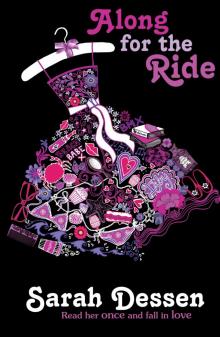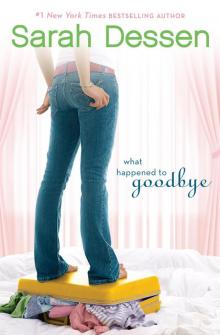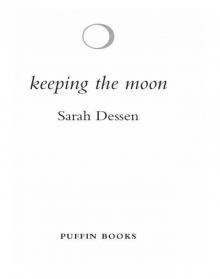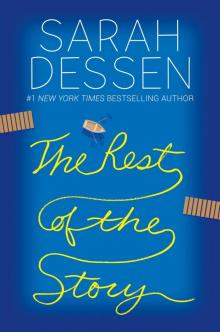- Home
- Sarah Dessen
Keeping the Moon Page 2
Keeping the Moon Read online
Page 2
Norman honked the horn twice and cut the engine. “She’s expecting you,” he said. He got out and went around to the back door, unloading my stuff and piling it on the front steps. He put the Buttmaster on the very top, arranging it just so. I couldn’t tell if he was being a smartass or what.
“Thanks,” I said under my breath, deciding he was.
Mira’s porch was the old southern kind: wide and long, running the entire length of the house, and I noticed two things about it right away. First, an old bicycle leaning against a front window. It had Cadillac-style fins over the back wheel and was spray-painted bright red, with a few rust spots showing through. In the metal basket on the front was a pair of sunglasses with big black frames.
The second thing I noticed was a small sign posted over the doorbell, an index card that read, in simple block letters, BELL. For the truly moronic, there was an arrow as well.
I was beginning to wonder what kind of world I had landed in.
“Norman?” A woman’s voice came from inside, filtering through the screen door. “Is that you?”
“Yeah,” Norman called back, walking up the steps and leaning in close against the screen, shielding his eyes with his hand. “The train was right on time, for once.”
“I can’t find him again,” said the woman, who I assumed must be my aunt Mira. She sounded like she was moving quickly, her voice strong at first and then fading. “He was here this morning but then I just lost track of him. . . .”
“I’ll look for him,” Norman said, already glancing down the porch and into the yard. “He never goes far. He’s probably just having issues with that dog again.”
“Issues?” I said.
“Big ones,” he said under his breath, still looking.
“Is Colie with you?” she said, her voice rising as she came closer.
“Yep,” Norman said. “She’s right here.”
I kept waiting for the door to open. It didn’t.
“I can’t stand it when he does this,” Mira said, her voice fading again. I looked at Norman, who was pacing the porch, peering over the rail to check under the house.
“We’ll find him,” Norman said. “Don’t worry.”
I just stood there. Obviously my aunt was as excited to see me as I was to come here.
I sat down next to my bag and pulled my knees to my chest. There was a rustle in the bushes, and the fattest tabby cat I’d ever seen poked his head out to look at me. He wound himself through the handrail, almost getting stuck, and brushed against me, leaving about an inch of cat hair on my black pants, jacket, and shirt. Then he climbed into my lap, clawed me for a second, and settled in.
“Cat Norman!” Norman said, and the cat turned to look at him, flicking his tail.
“What?” I said.
“Found him!” Norman yelled out.
“Did you?” said the voice from inside.
“You should take him in to her,” Norman said to me. “She’ll love you instantly.”
“I don’t like cats,” I said, trying to dislodge the monster from my lap. He was purring now, a loud, rumbling noise that sounded like a chainsaw.
“Cat Norman?” Mira called out. “Come here, you terrible thing, you!”
“Take him in,” Norman said again. “She’s waiting.” He started slowly down the steps. I noticed he moved everywhere slowly.
I stood up, the cat in my arms. He weighed about thirty pounds, as much as an entire set of KikiBell weights.
“I’ll see you later,” Norman said, already walking around the house, toward the backyard.
“Colie?” Mira said. Through the screen, I could almost make out a shape in the hallway. “Is he with you?”
I walked toward the door, the cat curled against me. “We’re coming,” I said, and I stepped inside.
The first thing I saw when my eyes adjusted was the TV in the next room. It was tuned to a wrestling match, and at that moment some huge man in a cape and a blindfold was leaping to flatten another man in purple spandex, who was writhing on the mat. As the caped man took off, his arms spread, you could see behind him rows and rows of people, aghast, as he fell fell fell toward his victim. Splat.
“Cat Norman!” my Aunt Mira said, stepping right in front of the TV and opening her arms to both of us. “And Colie. Hello!”
Mira was overweight, just like my mother had been before she became Kiki Sparks. She had a wide face and long red hair piled up on her head, like she’d done it in a hurry—a pencil and a pen were sticking out of it. She had on an old, deep green kimono patterned with dragons, a big white T-shirt, black leggings, and flip-flops. Her toenails were painted bright pink.
“Colie!” she cried again, and before I knew it she had wrapped her arms around both me and the cat. She smelled like a mix of vanilla and turpentine. “I’m so glad to see you. You look different, all grown up. And skinny! Your mom’s program must work then, right?”
“Right.” A piece of cat hair blew up my nose, and my eyes started watering.
“Bad, bad Cat Norman,” she said to the cat, who was mashed between us, still purring. “I wonder what kind of trouble you found on this adventure, huh?”
The cat sneezed. Then he wriggled out of my arms, pushed off, and landed with a thud not unlike the wrestler’s. He was obviously not a cat who did a lot of jumping; it was at least a second before his considerable girth caught up with him.
“Oh, you’re terrible!” she scolded as he walked off, taking his time. Then she looked at me, shaking her head. “He’s the light of my life, but he’s in his terrible twos right now and going through a real distant phase. It’s just breaking my heart.”
“The cat,” I said, verifying.
“Norman,” she corrected me.
“Oh, Norman,” I said, looking outside where I’d last seen him. “He does seem kind of spacey.”
“He does?” She raised her eyebrows. “Well, it is summer. The heat gets to him, you know. You should see the hairballs he coughs up.”
I looked back outside. “Norman does?”
“The cat,” she said. “Cat Norman.” She pointed under a chair by the door where he’d settled himself and was now licking his back leg, loudly.
“Oh,” I said. “I thought you meant . . .”
“Oh, Norman,” she said, and then she burst out laughing, one hand covering her mouth. She had deep dimples, like a child’s. “Oh, no, not that Norman. I mean, he might have hairballs, with all that long hair of his. But I’ve never seen him coughing anything up. . . .”
“I just didn’t know,” I said in a low voice, and I had that sudden flash that I was fat again, could feel it on me, like I always did when someone laughed at me.
“Well,” she said, linking her arm in mine, “it’s an honest mistake. Cat Norman was, after all, named after Norman Norman. They are so much alike in temperament. Not to mention they both move slower than molasses.”
“Norman Norman,” I repeated, as we stepped into the back room. It was big and sunny and, like the porch, ran the length of the house. On the TV another match was in progress, with two small redheaded men in black trunks circling each other.
“But I need them both desperately,” Mira said dramatically, glancing at the TV and then back at me. “If Norman Norman didn’t live downstairs I’d have no one to open jars for me, and Cat Norman is my baby.”
“Norman lives downstairs?” I said.
“Oh, yes,” she said easily, sitting down in the overstuffed chair across from the television and folding the kimono neatly over her legs. On the wall was a large painting of Mira and Cat Norman sitting on the grass in front of the house. In the painting she had on a white dress and pink sunglasses shaped like stars; she was smiling. Cat Norman was beside her, his back arched as her hand brushed over him. “He stays in the downstairs room. He’s no trouble. I forget he’s there half the time.”
As I sat down I took in the view of the ocean, the water blue and sparkling. There was a path that led down to the beach, and
when I craned my neck I could see an open door and then Norman, dragging one of the headless mannequins. To the right of the path I could see a smaller house, painted the same white as Mira’s. There was a clothesline beside it, with a row of brightly colored clothes flapping in the wind.
“So,” she said, settling back in her chair. “How was the trip?”
“Good.”
“And your mother?”
“Good.”
She nodded, flashing her dimples. “Did that hurt?”
“What?”
“That thing in your lip,” she said. “Ouch.”
“No,” I told her. “It didn’t.”
She nodded again. We were running out of topics. I glanced around the room. Everything was old, with a kind of tacky charm, and in need of some sort of repair: a rocking chair missing a few back slats, a small chest of drawers with faded pink paint and no knobs, a cracked fishtank full of seashells and marbles.
And then, as I looked more closely, I saw the notes. Just like the one out front, they were on index cards, written in nice block printing. WINDOW STICKS ON LEFT SIDE, it said next to the back door. CENTER LIGHT SWITCH DOES NOT WORK was posted by a switchplate on the other side of the room. And, taped to the TV set, right by the channel knob, my personal favorite: JIGGLE TO GET 11.
It was going to be a long summer.
“Oh, my!” Mira said suddenly, startling me. She lurched forward in her chair toward the television; like the cat, it took a second for everything to catch up. “Just look at that horrible El Gigantico. This isn’t even his match and he’s going in to attack that poor little Rex Runyon.”
“What?” I said, confused.
“Look!” She pointed toward the screen. “El Gigantico’s girl-friend, Lola Baby, left him for Rex Runyon last week. And now he’s going to beat poor Rex to a pulp. Oh, no. Why don’t the referees stop him? It’s just ludicrous.”
I just looked at her; she was leaning forward, eyes fixed on the screen. “Well,” I said, “it is all—”
“Oh!” One hand flew to her mouth, her pink toes wiggling as she reacted to something on the screen. “He’s pulling that figure-four move. Poor Rex. Oh, he’s going to feel that tomorrow. I don’t even know why El Gigantico cares about that Lola anyway, she’s just as trashy as she can be. . . .”
“Mira,” I said, “you know it’s . . .” She tore her eyes away from poor Rex Runyon, who was having his head slammed into the corner of the ring, repeatedly, while the crowd counted along.
“Know it’s what?” she said brightly. And I wished for a moment that she had a sign too, some index card with instructions to let me know how to proceed.
“Nothing. I . . . I forgot what I was going to say,” I said, and she settled back into the action. I was new here. I wasn’t about to be the one to tell her that it was all fake.
So I watched with her as Rex Runyon got a second wind and came back at El Gigantico, jumping on his back and bringing him to the mat like David slaying Goliath. The sun slowly set over the water while, downstairs, Norman dragged in the rest of his mannequins neck-first. Mira clapped her hands and cheered, with absolute faith, while Cat Norman sat in the windowsill, licking his paws one by one, as my summer began.
chapter two
We watched wrestling for about an hour. There were four matches, several arguments, and two referees chucked into the action and beaten severely.
“So,” Mira said finally, clicking off the TV as the local news came on, “I am dying for a grilled chicken salad. Are you hungry?”
“Yeah,” I said, realizing I was.
“Well, there’s a place just up on the corner,” she told me. “The food is great.”
“Okay,” I said, getting up and digging into my pocket for the money my mother had slipped me as I’d gotten on the train.
“Wait, wait. It’s your first night. Let me treat.” She picked up her purse—a big pink vinyl thing, which had to be a thrift shop find—drew out her wallet, and selected a twenty, which she held out to me.
“Aren’t you coming?” I asked.
“Oh, no, I’ll stay here. I’ve already been to town once today. And this way you can get a feel for the place, find your bearings, right?” she said easily, pulling the pen out of her hair and repositioning it with a jab. “Besides, there’s only room on the bike for one, unless you want to ride on the handlebars. But the last time we tried that, I hit a rock and Norman got pitched off and crash-landed into this fence and a bunch of poison ivy. It was just awful.”
“Wait,” I said, struggling to catch up. “The bike?”
“Yep. She’s out front.” She stood up, tightening the belt on her kimono. “Don’t worry, there’s a light and everything. And it’s a straight shot up to the Last Chance. Just watch out for the huge pothole and the Masons’ rottweiler and you’re home free.”
“What?”
“Their chicken Caesar salad is so good! ” she said. She was already heading toward the kitchen, the door creaking as she pushed it open. “And you just get whatever you want, okay?”
I turned to say something, but she was already gone, humming under her breath, as if she’d forgotten me already. I looked at the note on the door—BELL—and felt like I’d been caught up in some wild cyclone, like Dorothy thrown into Oz, with not a good witch in sight to save me.
But my stomach was growling, so I looked at the bike, thought better of it, and set off on foot down the steps, past the brightness of the porch light, into the dark.
The Last Chance Bar and Grill was a small building on the corner, right before the exit to the bridge that crossed over to the mainland. It had one lone streetlight, a few parking places, and a neon sign that said, Mira style, FOOD.
When I walked in, the first thing I saw was a tall bony girl throwing some kind of a fit.
“I am telling you,” she was saying to another girl, a curvy blonde with her hand on her hip. “If I get less than fifteen percent again tonight I am going to kill someone.”
“Uh-huh,” the blonde said. She was standing by the coffee machine, watching it brew.
“Mark my words,” said the bony girl. She had a short haircut with bangs straight across her forehead. She turned and looked toward the back corner of the restaurant, where a group of men in suits were standing up and pushing in their chairs, making leaving noises.
The blonde turned from the coffee machine and looked at me. She had on bright red lipstick. “Can I help you?”
“I need to order some takeout,” I said. My voice sounded loud in the almost-empty room.
“Menu’s right there,” she said, pointing to a stack right beside my elbow. She was staring at my lip. “Let me know when you’re ready.”
The tall girl brushed past me as she came out from behind the counter, then stepped aside as the suits left. One man toward the back was chewing on a toothpick, smacking his lips. The blonde settled in against the opposite side of the counter, watching me.
“Y’all have a good night,” the tall girl said.
“You too,” one of the men mumbled.
I went back to scanning the menu, all of it standard beach food: fried seafood, burgers, onion rings, the kind of stuff that had been banned from our house since my mother was born again as Kiki Sparks. It had been months since I’d had a french fry, much less a burger, and my mouth was already watering.
“I knew it,” the tall girl said from across the room. She was standing by the table the suits had just abandoned, a bunch of change in her hand. “A dollar seventy. On a thirty-dollar tab.”
“Well.” The blonde was clearly used to hearing this.
“Goddammit,” the tall girl said. “Okay, then. That is it.”
The blonde looked at me. “You ready?”
“Yeah.”
She took her time coming over, pulling out a ticket from the apron tied loosely around her waist. “Go ahead.”
“I’m not going to take this anymore,” the tall girl said as she started across the room. She h
ad big, flat feet that smacked the floor with each step.
“Grilled chicken salad,” I said, remembering Mira’s request, “and a cheeseburger with fries. And onion rings.”
The blonde nodded, writing this down. “Anything else?”
“No.”
The tall girl stopped right next to me and slammed the handful of change down on the counter, one dime bouncing off to hit the floor with a ping. “I can’t take it anymore,” she said dramatically. “I will remain silent no longer.”
“You need ketchup with that?” the blonde said to me, ignoring her.
“Uh, yeah,” I said.
The tall girl was taking off her apron, balling it up in her hands. “I don’t want to have to do it,” she said.
“Mayonnaise?” the blonde asked.
“No,” I said.
“I quit! ” the tall girl announced, throwing her apron at the blonde, who reached up and caught it without even looking. “And now, I will go out and give those rude, inconsiderate fascists a piece of my mind.” She took two strides to the door, kicked it open with a bang, and was gone. The door swung shut, the screen rattling.
The blonde, still holding the apron, walked to the window and stuck my ticket on a spindle. “Order up.”
“All right,” a guy’s voice said, and then I saw Norman Norman poke his head out and grab the ticket. The blue sunglasses were parked on top of his head. “Where’s Morgan?” he asked.
“Quit,” the blonde said in a bored voice. She’d pulled out a Vogue magazine from somewhere and was flipping the pages.
Norman smiled that sleepy smile, then glanced toward the door and saw me. “Hey, Colie,” he said. “This for you and Mira?”
“Yeah,” I said. The blonde looked at me again.
“Cool,” Norman said, and he waved before disappearing back behind the window.
I stood there, waiting for my food; in the kitchen, a radio was playing softly. About ten minutes passed before the door creaked behind me and the tall girl—Morgan—came back in, mumbling under her breath.

 Just Listen
Just Listen Along for the Ride
Along for the Ride This Lullaby
This Lullaby Once and for All
Once and for All Lock and Key
Lock and Key The Truth About Forever
The Truth About Forever Someone Like You
Someone Like You What Happened to Goodbye
What Happened to Goodbye Dreamland
Dreamland Keeping the Moon
Keeping the Moon The Rest of the Story
The Rest of the Story The Moon and More
The Moon and More What Happens to Goodbye
What Happens to Goodbye